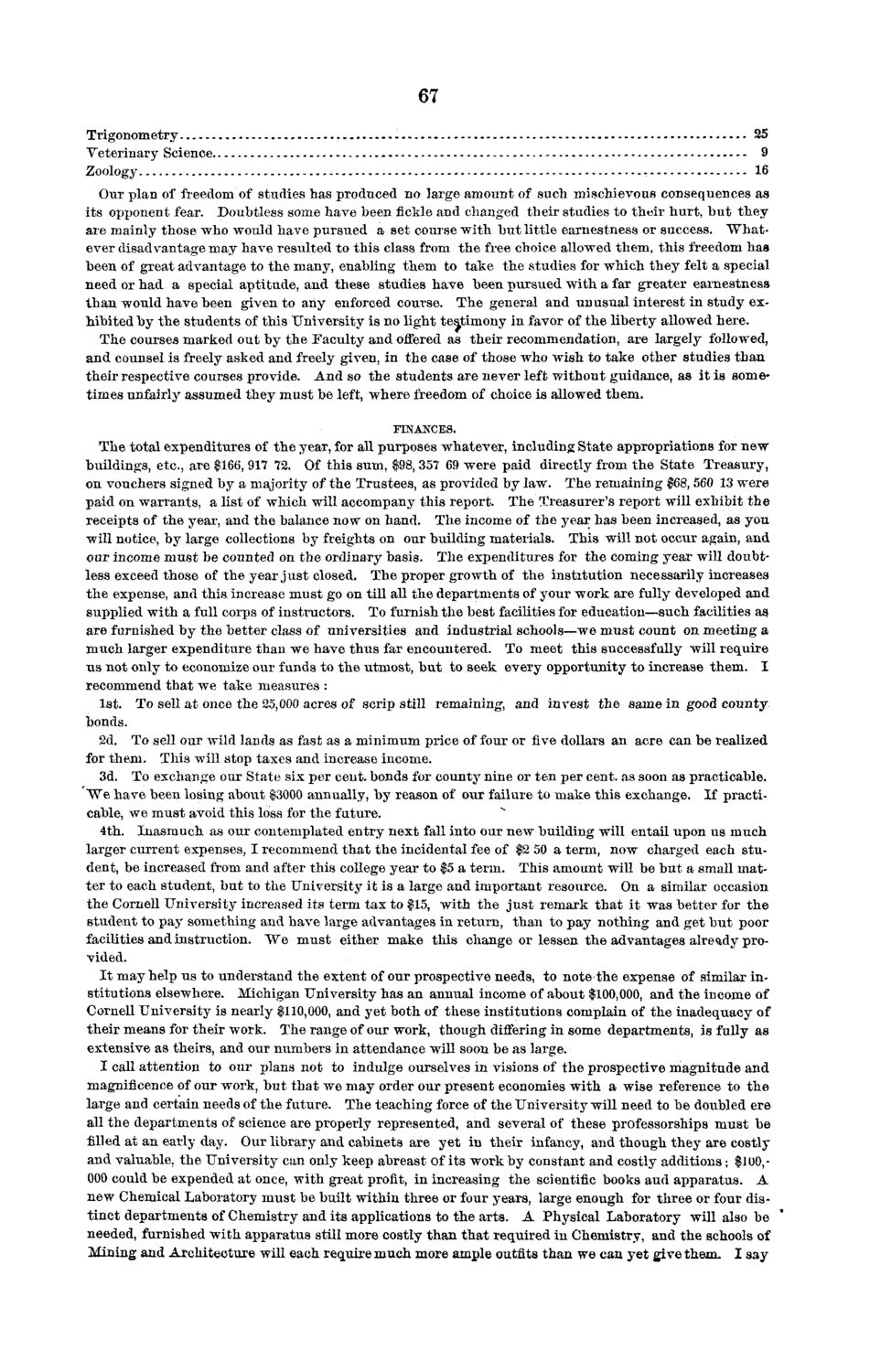| |
| |
Caption: Board of Trustees Minutes - 1872
This is a reduced-resolution page image for fast online browsing.

EXTRACTED TEXT FROM PAGE:
67 Trigonometry 25 Veterinary Science 9 Zoology 16 Our plan of freedom of studies has produced no large amount of such mischievous consequences as its opponent fear. Doubtless some have been fickle and changed their studies to their hurt, but they are mainly those who would have pursued a set course with but little earnestness or success. Whatever disadvantage may have resulted to this class from the free choice allowed them, this freedom has been of great advantage to the many, enabling them to take the studies for which they felt a special need or had a special aptitude, and these studies have been pursued with a far greater earnestness than would have been given to any enforced course. The general and unusual interest in study exhibited by the students of this University is no light testimony in favor of the liberty allowed here. The courses marked out by the Faculty and offered as their recommendation, are largely followed, and counsel is freely asked and freely given, in the case of those who wish to take other studies than their respective courses provide. And so the students are never left without guidance, as it is sometimes unfairly assumed they must be left, where freedom of choice is allowed them. FINANCES. The total expenditures of the year, for all purposes whatever, including State appropriations for new buildings, etc., are $166, 917 72. Of this sum, $98, 357 69 were paid directly from the State Treasury, on vouchers signed by a majority of the Trustees, as provided by law. The remaining $68,560 13 were paid on warrants, a list of which will accompany this report. The Treasurer's report will exhibit the receipts of the year, and the balance now on hand. The income of the year has been increased, as you will notice, by large collections by freights on our building materials. This will not occur again, and our income must be counted on the ordinary basis. The expenditures for the coming year will doubtless exceed those of the year just closed. The proper growth of the institution necessarily increases the expense, and this increase must go on till all the departments of your work are fully developed and supplied with a full corps of instructors. To furnish the best facilities for education—such facilities as. are furnished by the better class of universities and industrial schools—we must count on meeting a much larger expenditure than we have thus far encountered. To meet this successf ally will require us not only to economize our funds to the utmost, but to seek every opportunity to increase them. I recommend that we take measures : 1st. To sell at once the 25,000 acres of scrip still remaining, and invest the same in good county bonds. 2d. To sell our wild lands as fast as a minimum price of four or five dollars an acre can be realized for them. This will stop taxes and increase income. 3d. To exchange our State six per cent, bonds for county nine or ten per cent, as soon as practicable. "We have been losing about $3000 annually, by reason of our failure to make this exchange. If practicable, we must avoid this loss for the future. 4th. Inasmuch as our contemplated entry next fall into our new building will entail upon us much larger current expenses, I recommend that the incidental fee of $2 50 a term, now charged each student, be increased from and after this college year to $5 a term. This amount will be but a small matter to each student, but to the University it is a large and important resource. On a similar occasion the Cornell University increased its term tax to $15, with the just remark that it was better for the student to pay something and have large advantages in return, than to pay nothing and get but poor facilities and instruction. We must either make this change or lessen the advantages already provided. I t may help us to understand the extent of our prospective needs, to note the expense of similar institutions elsewhere. Michigan University has an annual income of about $100,000, and the income of Cornell University is nearly $110,000, and yet both of these institutions complain of the inadequacy of their means for their work. The range of our work, though differing in some departments, is fully as extensive as theirs, and our numbers in attendance will soon be as large. I call attention to our plans not to indulge ourselves in visions of the prospective magnitude and magnificence of our work, but that we may order our present economies with a wise reference to the large and certain needs of the future. The teaching force of the University will need to be doubled ere all the departments of science are properly represented, and several of these professorships must be filled at an early day. Our library and cabinets are yet in their infancy, and though they are costly and valuable, the University can only keep abreast of its work by constant and costly additions; $100,000 could be expended at once, with great profit, in increasing the scientific books aud apparatus. A new Chemical Laboratory must be built within three or four years, large enough for three or four distinct departments of Chemistry and its applications to the arts. A Physical Laboratory will also be needed, furnished with apparatus still more costly than that required in Chemistry, and the schools of Mining and Architecture will each require much more ample outfits than we can yet give them. I say
| |